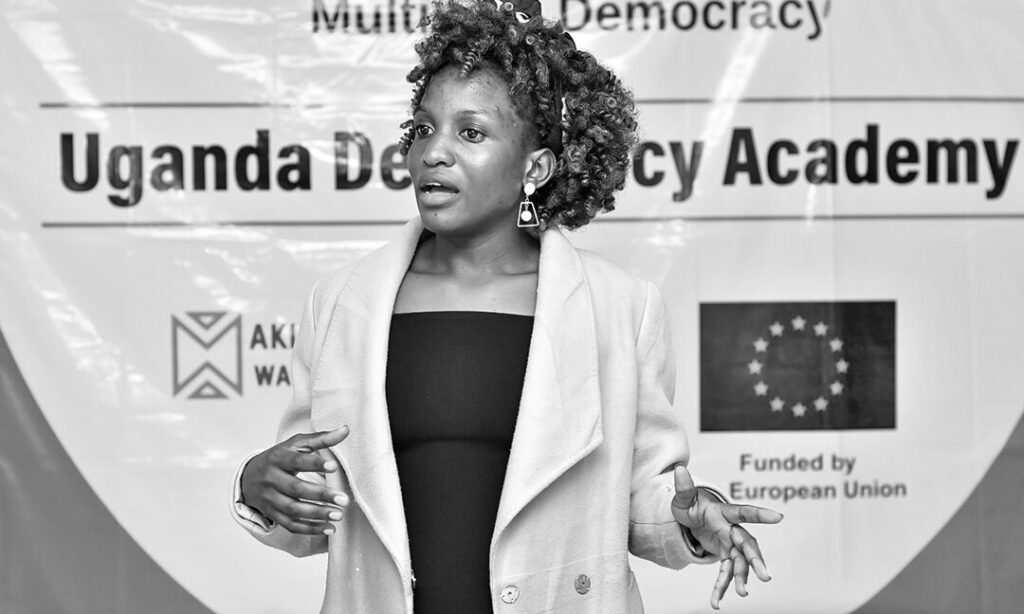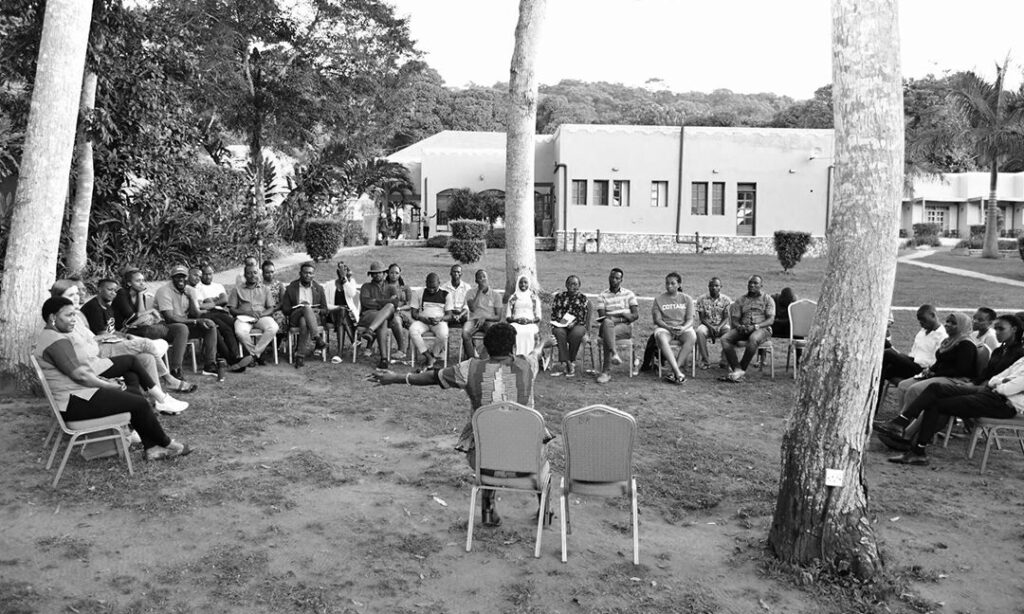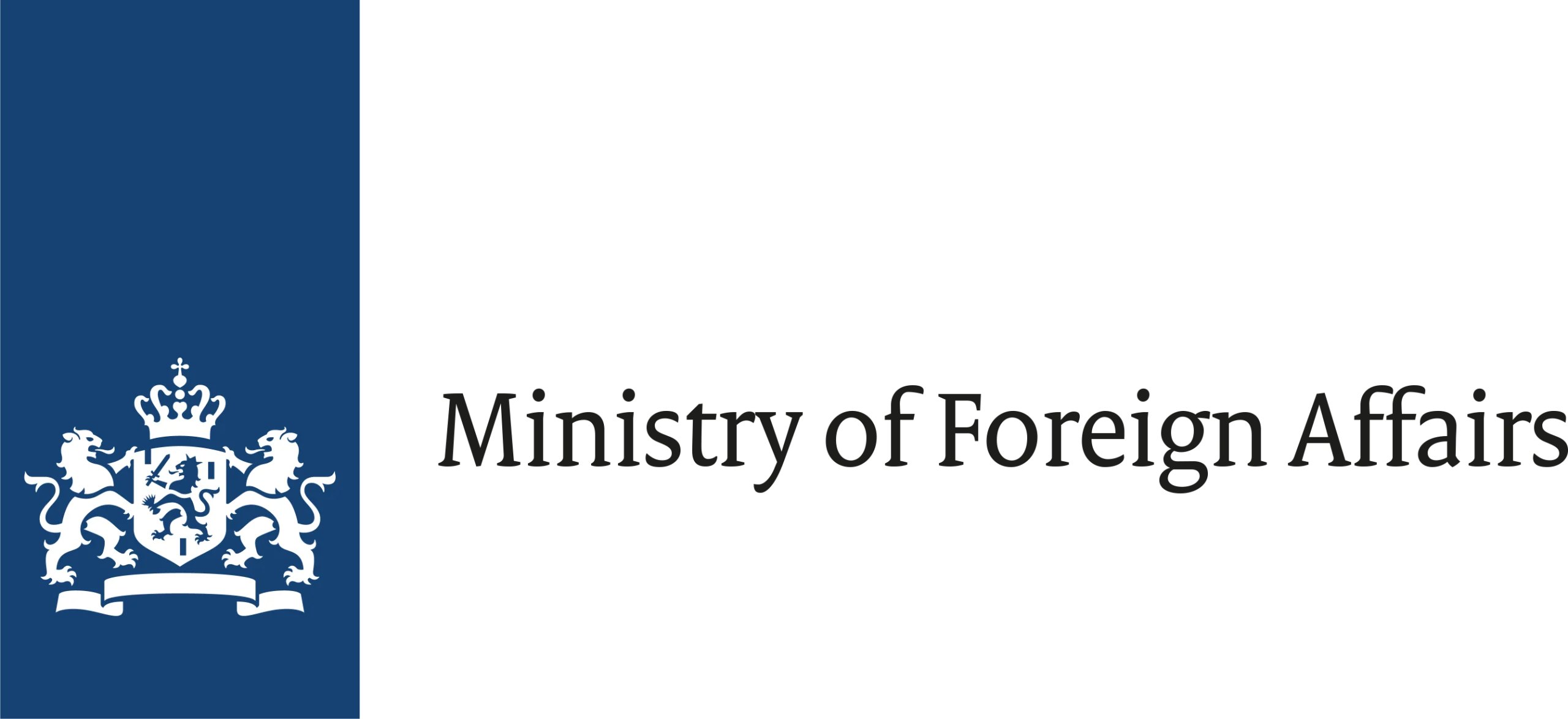Ouganda


- Le NIMD en Ouganda : En un coup d'œil
- Notre action
- Comment nous procédons
- Rencontrer l'équipe
Objectif principal
Nous rassemblons des personnes au-delà des clivages politiques et idéologiques pour contribuer à des processus politiques inclusifs par le dialogue et le renforcement des capacités des différents acteurs politiques et institutions afin de faire progresser la culture, le système et les valeurs démocratiques en Ouganda.
Résultats
Depuis le début de son travail en 2009, le NIMD Ouganda s'est adapté avec succès à l'évolution du paysage politique du pays. Qu'il s'agisse de soutenir le dialogue multipartite ou d'autonomiser les jeunes par le biais de l'Uganda Democracy Academy, nous avons toujours répondu aux dynamiques changeantes par des approches novatrices. Mais notre engagement durable en faveur du dialogue et de l'inclusion signifie que nous continuons à renforcer la démocratie ougandaise de manière significative et durable.
Les dirigeants du Multiparty Youth Forum du NIMD ont travaillé au-delà des partis et des lignes idéologiques pour rédiger sept propositions de réforme électorale, y compris une réduction des frais de nomination et la réglementation du financement des campagnes électorales. Ils ont présenté ces propositions à la Commission électorale et au ministre de la Justice. En unissant leurs voix, ces jeunes leaders ont fait en sorte que leurs préoccupations soient directement entendues par ceux qui élaborent les lois électorales de l'Ouganda.
En fournissant à nos participants les outils et la confiance nécessaires pour s'engager en politique et apporter des contributions significatives à leurs communautés, notre Uganda Democracy Academy crée un vaste réseau de jeunes gens engagés et compétents, qui s'étend au-delà des clivages politiques traditionnels. Les anciens participants de l'Uganda Democracy Academy ont assumé des rôles de premier plan au sein de leurs communautés, notamment en tant que président des jeunes conseillers du Buganda et vice-président de l'association des étudiants ougandais. Ce qu'il faut faire'plus, deux jeunes femmes leaders ont annoncé publiquement qu'ils souhaitaient se présenter aux élections de 2026. Cela s'ajoute à plus de 85 jeunes leaders de l'Académie de la démocratie en Ouganda et d'autres programmes du NIMD qui ont exprimé leur intérêt à se présenter en Ouganda.'L'objectif est de permettre à l'Union européenne de participer aux élections générales de 2026, depuis diverses positions au sein du Conseil national de la jeunesse jusqu'à la politique générale.
Ouganda : Contexte politique
L'entrée en politique est un défi pour les jeunes, les femmes et les autres groupes sous-représentés en Ouganda. les coûts élevés de la candidature aux élections s'avèrent souvent inatteignables. Même pour ceux qui parviennent à se faire élire, ces groupes sont confrontés à un environnement politique dominé par les stéréotypes de genre et les attentes de la société. De jeunes politiciens, par exemple, ont déclaré qu'ils avaient dû se marier pour accroître leur éligibilité. Quant aux jeunes femmes politiques, en particulier celles des partis d'opposition, elles font souvent les frais d'un discours très sexualisé.
Ces problèmes se reflètent également dans le paysage démocratique plus large de l'Ouganda. Alors que le pays est passé d'un ancien système à parti unique, il s'est avéré difficile d'institutionnaliser des pratiques visant à renforcer la démocratie, les possibilités d'engagement des citoyens étant limitées et les partis d'opposition ayant souvent du mal à obtenir un financement.
Parmi les exemples de rétrécissement de l'espace démocratique, on peut citer la législation répressive à l'encontre des groupes minoritaires et la limitation continue du droit de réunion des partis politiques.
Dans ce contexte, l'instauration d'un climat de confiance constitue une voie essentielle pour aller de l'avant. Il crée des espaces où des personnes d'origines et de points de vue différents peuvent s'engager de manière significative, en faisant tomber les barrières de la méfiance et de l'exclusion. En favorisant ces liens au-delà des clivages politiques et idéologiques, l'Ouganda peut cultiver une culture politique qui valorise la collaboration et la compréhension mutuelle.
Au NIMD, nous pensons qu'il s'agit là de la clé pour créer une démocratie ouverte aux besoins de chacun, respectueuse des différents points de vue et garantissant la participation pleine et égale de tous.
Notre action
Au NIMD Ouganda, notre principal objectif est de mettre en relation des personnes aux perspectives, aux origines et aux idéologies politiques diverses. Toutes nos activités visent à rassembler les gens pour instaurer la confiance, favoriser le respect et trouver un consensus.
Nos dialogues réunissent différents groupes - jeunes, femmes politiques, société civile et représentants élus - pour qu'ils s'écoutent et collaborent. Il est essentiel d'instaurer la confiance entre ces groupes, et celle-ci se développe grâce à des conversations continues et ouvertes. En veillant à ce que chacun ait un siège à la table et que sa voix soit entendue, nous nous rapprochons d'une démocratie véritablement inclusive et réactive.
Deuxièmement, nous veillons à ce que les différents groupes aient accès aux connaissances, aux compétences et aux outils dont ils ont besoin pour naviguer dans le paysage politique ougandais. Notre Académie de la démocratie en Ouganda rassemble des dirigeants politiques et civiques au-delà des clivages politiques et idéologiques.
En veillant à ce que chacun ait un siège à la table et que sa voix soit entendue, nous nous rapprochons d'une démocratie véritablement inclusive et réactive.
Ce que nous faisons : En chiffres
Comment nous procédons
La jeunesse en politique
L'Ouganda est le deuxième pays le plus jeune du monde. Avec 78% de sa population âgée de moins de 30 ans, le pays dispose d'une jeunesse motivée et politiquement engagée. Les jeunes leaders travaillent activement à façonner les processus démocratiques de leur pays, et nombre d'entre eux sont impliqués dans le plaidoyer et l'activisme de base sur des questions telles que la réforme électorale, le chômage et les droits de l'homme.
Rassembler les jeunes leaders civiques et politiques est la pierre angulaire de notre travail sur la participation politique des jeunes en Ouganda. Notre Forum multipartite de la jeunesse - une plateforme de collaboration entre jeunes de différents partis - réunit les participants au-delà des clivages idéologiques pour qu'ils puissent dialoguer.
Parallèlement à nos dialogues intergénérationnels entre des politiciens établis et de jeunes leaders, ces dialogues offrent de réelles opportunités de briser les stéréotypes et de renforcer la confiance entre les générations. C'est aussi l'occasion pour les jeunes d'influencer le paysage politique, que ce soit en unissant leurs voix derrière des initiatives de jeunes ou en présentant des propositions qui renforcent la participation politique significative des jeunes.
Pour compléter ces efforts, l'Académie de la démocratie en Ouganda du NIMD dote les participants des connaissances, des compétences et du réseau dont ils ont besoin pour contribuer efficacement à la vie politique, favoriser l'engagement en faveur des valeurs démocratiques et contribuer à long terme à un changement positif.
Enfin, le NIMD reconnaît que le système politique lui-même doit changer, afin de créer des opportunités pour la participation des jeunes. Nous nous efforçons d'ouvrir les portes de la politique en fournissant aux politiciens des informations et en les sensibilisant par le biais du lobbying et du plaidoyer. Par exemple, en 2021, la NIMD s'est associée à la Fondation de la démocratie de Westminster pour produire un rapport et un site web sur le coût élevé de la candidature aux élections en Ouganda - en soulignant, en particulier, comment ces coûts excluent les jeunes et les femmes de la politique. Nous avons présenté nos conclusions aux politiciens et aux institutions politiques, appelant les décideurs à uniformiser les règles du jeu.
Dialogue
Le travail de dialogue du NIMD en Ouganda a commencé en 2010, lorsque nous avons aidé les partis politiques du pays à établir l'Organisation interpartis pour le dialogue (IPOD), un forum ouvert où les partis au pouvoir et les partis d'opposition se réunissent sur un pied d'égalité.
S'appuyant sur ces fondements, nos initiatives de dialogue continuent de mettre l'accent sur l'instauration d'un climat de confiance qui transcende les clivages politiques. Par le biais du dialogue, nous nous engageons auprès des jeunes, des femmes et de la société civile. Nous créons des espaces permettant à ces groupes de travailler ensemble, de fixer des objectifs communs et de plaider ensemble pour le progrès démocratique. Nous sommes en effet convaincus que leurs voix sont essentielles pour que la démocratie ougandaise réponde aux besoins de l'ensemble de la population.
Un exemple est le Forum multipartite de la jeunesse, qui rassemble de jeunes leaders civiques et politiques de tout l'éventail politique pour engager le dialogue. Les participants s'engagent dans une collaboration entre partis, élaborent des propositions communes et plaident en faveur de la participation des jeunes à la vie politique.
Mais le Forum ne se contente pas de rassembler les jeunes. Grâce aux dialogues intergénérationnels, il les met directement en contact avec des politiciens et des décideurs établis. En plus d'offrir une importante opportunité de réseautage, ces dialogues contribuent également à renforcer la confiance et à réduire la polarisation entre les générations en politique.
De plus, les dialogues offrent aux jeunes de réelles possibilités d'influencer la politique. Par exemple, le ministre de la justice s'est engagé à rencontrer les jeunes leaders pour leur présenter des propositions concrètes visant à promouvoir la participation des jeunes à la vie politique.
"Nos initiatives de dialogue continuent de mettre l'accent sur l'instauration d'un climat de confiance au-delà des clivages politiques.
Démocratie et éducation
L'Uganda Democracy Academy (UDA) du NIMD a pour mission de veiller à ce que les jeunes disposent des connaissances et des compétences nécessaires pour influencer la politique et défendre les valeurs démocratiques.
Les participants, qui représentent sept partis politiques et diverses structures nationales de jeunesse de tout l'Ouganda, se réunissent pour un programme rigoureux de 18 jours dans le cadre d'une retraite. Ils sont immergés dans leur nouvel environnement, un espace sûr et diversifié où ils peuvent construire des réseaux durables et établir des liens au-delà des clivages politiques.
L'UDA est adaptée au paysage politique complexe de l'Ouganda, avec un programme qui combine théorie et pratique. Par le biais de travaux de groupe, de débats, de conférences, d'histoires personnelles et de films, les jeunes leaders apprennent la théorie politique, la bonne gouvernance et la politique inclusive, entre autres sujets.
Au-delà du programme d'études, l'Académie met l'accent sur la collaboration, la confiance et le respect. Les activités extrascolaires telles que les promenades dans la nature et les conversations autour d'un feu de camp favorisent la solidarité et le travail en réseau entre les participants.
En effet, au fur et à mesure du déroulement du cours, les participants ont déclaré être "unis dans la diversité", les différences entre les partis politiques et les régions s'estompant au profit de la confiance et du respect.
"Bien que nous soyons de partis politiques et d'opinions différents, nous pouvons discuter, nous mettre d'accord sur des solutions et, plus important encore, nous considérer les uns les autres comme des êtres humains" Participant de l'Académie 2023.
Notre Sénat national des jeunes et les bourses mensuelles de l'UDA offrent une plateforme aux jeunes leaders pour maintenir ces liens, en s'engageant dans un dialogue et une collaboration continus sur des questions essentielles.
Ainsi, alors qu'ils entrent à l'Académie en tant que groupe divisé par les différences, nos participants repartent avec des liens durables, la conviction d'une collaboration respectueuse au-delà des clivages et un réseau solide de jeunes gens bien informés, compétents et déterminés à œuvrer en faveur d'une démocratie plus inclusive et réactive en Ouganda.
"Nos participants repartent avec des liens durables, la conviction d'une collaboration respectueuse au-delà des clivages et un réseau solide de jeunes gens bien informés, compétents et déterminés à œuvrer en faveur d'une démocratie plus inclusive et plus réactive en Ouganda.
Les femmes en politique
Dans le cadre de toutes ses activités, le NIMD Ouganda s'efforce également de veiller à ce que les femmes puissent occuper la place qui leur revient en politique. Nous le faisons, par exemple, en garantissant la parité hommes-femmes dans notre Forum multipartite de la jeunesse et notre Académie ougandaise de la démocratie.
En outre, nous travaillons directement avec les femmes politiques, en leur fournissant les outils et les connaissances nécessaires pour naviguer dans un système politique souvent entaché de stéréotypes sexistes et de pratiques discriminatoires. Nous proposons des formations et des possibilités de mise en réseau, et nous encourageons le mentorat entre les jeunes femmes politiques en herbe et les politiciennes plus expérimentées.
Rencontrer l'équipe
 Primus Bahiigi
Directeur national, NIMD Ouganda
En savoir plus
Primus Bahiigi
Directeur national, NIMD Ouganda
En savoir plus
Contactez directement le NIMD Ouganda via nimduganda@nimd.org
Primus Atukwatse Bahiigi est un praticien de la gouvernance et du développement qui possède plus de 15 ans d'expérience dans le domaine de la société civile et du développement. Avant de devenir directeur du NIMD en Ouganda, Primus a occupé diverses fonctions, notamment celles de directeur de programme au NIMD, de directeur de programme pour les plateformes mondiales à ActionAid International et de coordinateur de programme pour le programme multinational sur l'architecture de la gouvernance africaine à ActionAid International. Il est actif dans diverses organisations de la société civile et siège à plusieurs conseils d'administration, dont celui de la fondation Faraja Africa. Primus représente également la société civile au sein du Comité national de lutte contre le terrorisme.

Contactez directement le NIMD Ouganda via nimduganda@nimd.org
Primus Atukwatse Bahiigi est un praticien de la gouvernance et du développement qui possède plus de 15 ans d'expérience dans le domaine de la société civile et du développement. Avant de devenir directeur du NIMD en Ouganda, Primus a occupé diverses fonctions, notamment celles de directeur de programme au NIMD, de directeur de programme pour les plateformes mondiales à ActionAid International et de coordinateur de programme pour le programme multinational sur l'architecture de la gouvernance africaine à ActionAid International. Il est actif dans diverses organisations de la société civile et siège à plusieurs conseils d'administration, dont celui de la fondation Faraja Africa. Primus représente également la société civile au sein du Comité national de lutte contre le terrorisme.
Avec qui nous travaillons

Le travail du NIMD en Ouganda est financé par le ministère néerlandais des affaires étrangères dans le cadre du programme d'interventions stratégiques et du programme d'aide de l'Union européenne. Le pouvoir du dialogue programme. Le consortium "Power of Dialogue" est composé du NIMD, Institut Gorée, Akina Mama wa Afrikaet Centre des Études Méditerranéennes InternationalesL'objectif est d'améliorer la collaboration entre les acteurs politiques et civiques afin qu'ils participent à des processus politiques responsables.
L'Académie de la démocratie en Ouganda est mise en œuvre dans le cadre du programme d'engagement civique WYDE par l'Institut néerlandais pour la démocratie multipartite, avec le soutien de la Commission européenne. Fondation de Westminster pour la démocratie et Démonstration Finlande.
WYDE est soutenu par l'Union européenne et la Commission européenne. Partenariat européen pour la démocratie (EPD).

 Facebook
Facebook X
X LinkedIn
LinkedIn